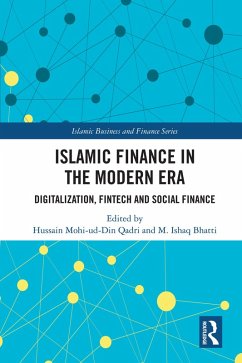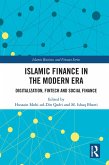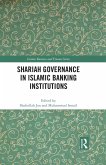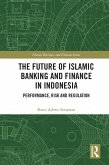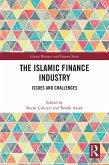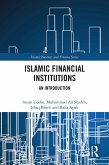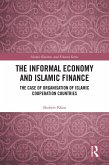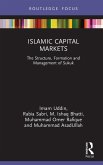Islamic Finance in the Modern Era (eBook, ePUB)
Digitalization, FinTech and Social Finance
Redaktion: Qadri, Hussain Mohi-Ud-Din; Bhatti, M. Ishaq
42,95 €
42,95 €
inkl. MwSt.
Sofort per Download lieferbar

21 °P sammeln
42,95 €
Als Download kaufen

42,95 €
inkl. MwSt.
Sofort per Download lieferbar

21 °P sammeln
Jetzt verschenken
Alle Infos zum eBook verschenken
42,95 €
inkl. MwSt.
Sofort per Download lieferbar
Alle Infos zum eBook verschenken

21 °P sammeln
Islamic Finance in the Modern Era (eBook, ePUB)
Digitalization, FinTech and Social Finance
Redaktion: Qadri, Hussain Mohi-Ud-Din; Bhatti, M. Ishaq
- Format: ePub
- Merkliste
- Auf die Merkliste
- Bewerten Bewerten
- Teilen
- Produkt teilen
- Produkterinnerung
- Produkterinnerung

Bitte loggen Sie sich zunächst in Ihr Kundenkonto ein oder registrieren Sie sich bei
bücher.de, um das eBook-Abo tolino select nutzen zu können.
Hier können Sie sich einloggen
Hier können Sie sich einloggen
Sie sind bereits eingeloggt. Klicken Sie auf 2. tolino select Abo, um fortzufahren.

Bitte loggen Sie sich zunächst in Ihr Kundenkonto ein oder registrieren Sie sich bei bücher.de, um das eBook-Abo tolino select nutzen zu können.
This book focuses on recent developments in financial technology, specifically, how Fintech affects the Islamic finance industry. It simultaneously presents theories, practice, and key issues and examines the challenges of shariah compliance and explores opportunities for riba-free finance.
- Geräte: eReader
- mit Kopierschutz
- eBook Hilfe
Andere Kunden interessierten sich auch für
![Islamic Finance in the Modern Era (eBook, PDF) Islamic Finance in the Modern Era (eBook, PDF)]() Islamic Finance in the Modern Era (eBook, PDF)42,95 €
Islamic Finance in the Modern Era (eBook, PDF)42,95 €![Shariah Governance in Islamic Banking Institutions (eBook, ePUB) Shariah Governance in Islamic Banking Institutions (eBook, ePUB)]() Shariah Governance in Islamic Banking Institutions (eBook, ePUB)42,95 €
Shariah Governance in Islamic Banking Institutions (eBook, ePUB)42,95 €![The Future of Islamic Banking and Finance in Indonesia (eBook, ePUB) The Future of Islamic Banking and Finance in Indonesia (eBook, ePUB)]() Romi Adetio SetiawanThe Future of Islamic Banking and Finance in Indonesia (eBook, ePUB)42,95 €
Romi Adetio SetiawanThe Future of Islamic Banking and Finance in Indonesia (eBook, ePUB)42,95 €![The Islamic Finance Industry (eBook, ePUB) The Islamic Finance Industry (eBook, ePUB)]() The Islamic Finance Industry (eBook, ePUB)42,95 €
The Islamic Finance Industry (eBook, ePUB)42,95 €![Islamic Financial Institutions (eBook, ePUB) Islamic Financial Institutions (eBook, ePUB)]() Imam UddinIslamic Financial Institutions (eBook, ePUB)44,95 €
Imam UddinIslamic Financial Institutions (eBook, ePUB)44,95 €![The Informal Economy and Islamic Finance (eBook, ePUB) The Informal Economy and Islamic Finance (eBook, ePUB)]() Shabeer KhanThe Informal Economy and Islamic Finance (eBook, ePUB)42,95 €
Shabeer KhanThe Informal Economy and Islamic Finance (eBook, ePUB)42,95 €![Islamic Capital Markets (eBook, ePUB) Islamic Capital Markets (eBook, ePUB)]() Imam UddinIslamic Capital Markets (eBook, ePUB)21,95 €
Imam UddinIslamic Capital Markets (eBook, ePUB)21,95 €-
-
-
This book focuses on recent developments in financial technology, specifically, how Fintech affects the Islamic finance industry. It simultaneously presents theories, practice, and key issues and examines the challenges of shariah compliance and explores opportunities for riba-free finance.
Dieser Download kann aus rechtlichen Gründen nur mit Rechnungsadresse in A, B, BG, CY, CZ, D, DK, EW, E, FIN, F, GR, HR, H, IRL, I, LT, L, LR, M, NL, PL, P, R, S, SLO, SK ausgeliefert werden.
Produktdetails
- Produktdetails
- Verlag: Taylor & Francis eBooks
- Erscheinungstermin: 16. August 2024
- Englisch
- ISBN-13: 9781040091708
- Artikelnr.: 72240982
- Verlag: Taylor & Francis eBooks
- Erscheinungstermin: 16. August 2024
- Englisch
- ISBN-13: 9781040091708
- Artikelnr.: 72240982
- Herstellerkennzeichnung Die Herstellerinformationen sind derzeit nicht verfügbar.
Hussain Mohi-ud-Din Qadri is Deputy Chairman of the Board of Governors of Minhaj University, Lahore; Professor at the School of Economics and Finance, Minhaj University, Lahore, Pakistan; and Senior Fellow, the University of Melbourne, Australia. M. Ishaq Bhatti is Professor of Finance, School of Business and Economics, Universiti Brunei Darussalam, and Adjunct Professor Finance & Financial Econometrics and the Founding Director of the Islamic Banking and Finance Programme at La Trobe University, Australia.
1. Issues in Islamic Economics and Finance: Exploring the Path to
Socio-Economic Justice 2. Emergence of Islamic Digital Economy 3. The Role
of Islamic Social Finance in Poverty Eradication 4. Islamic Financial
Technology and its Success in Countering the Impact of the COVID-19
Pandemic on SMEs 5. Islamic Framework for Behavioral and Socio-Economic
Justice 6. Islamic Banking in Non-Muslim Countries 7. Shariah Indices and
Human Wellbeing 8. Islamic Insurance (Takaful): An Overview 9. Determinants
of Islamic Banking Industry Performance: Does Economic ValMatter? 10. An
Analysis of Credit Risk in ASEAN and GCC Islamic Banks 11. Mediating Effect
of Corporate Image towards Islamic Bank Loyalty: The Role of Religiosity,
Collectivism, Sight Cues, and CSR 12. Gender Disparities in Corporate
E-Discourse of Islamic Banks in Pakistan 13. Evaluation of Environmental,
Social, and Governance Criteria in Banking Practices. A Comparison of
Islamic and Conventional Banks of Pakistan 14. Islamic Finance and the
Shadow Economy 15. Mutual Fund Performance: The Case of Saudi Arabia 16.
Strident Response of Islamic Banking Industry to Political, Financial, and
Pandemic Events 17. Interpretations of Musharakah Mutanaqisah in Islamic
Finance: A Cross-Cultural Perspective 18. Opportunities for Developing New
Islamic Financial Services in the Emerging Market 19. The Power of
Faith-Based Finance: How Islamic Finance Supports the Achievement of the
Sustainable Development Goals 20. Concluding Remarks
Socio-Economic Justice 2. Emergence of Islamic Digital Economy 3. The Role
of Islamic Social Finance in Poverty Eradication 4. Islamic Financial
Technology and its Success in Countering the Impact of the COVID-19
Pandemic on SMEs 5. Islamic Framework for Behavioral and Socio-Economic
Justice 6. Islamic Banking in Non-Muslim Countries 7. Shariah Indices and
Human Wellbeing 8. Islamic Insurance (Takaful): An Overview 9. Determinants
of Islamic Banking Industry Performance: Does Economic ValMatter? 10. An
Analysis of Credit Risk in ASEAN and GCC Islamic Banks 11. Mediating Effect
of Corporate Image towards Islamic Bank Loyalty: The Role of Religiosity,
Collectivism, Sight Cues, and CSR 12. Gender Disparities in Corporate
E-Discourse of Islamic Banks in Pakistan 13. Evaluation of Environmental,
Social, and Governance Criteria in Banking Practices. A Comparison of
Islamic and Conventional Banks of Pakistan 14. Islamic Finance and the
Shadow Economy 15. Mutual Fund Performance: The Case of Saudi Arabia 16.
Strident Response of Islamic Banking Industry to Political, Financial, and
Pandemic Events 17. Interpretations of Musharakah Mutanaqisah in Islamic
Finance: A Cross-Cultural Perspective 18. Opportunities for Developing New
Islamic Financial Services in the Emerging Market 19. The Power of
Faith-Based Finance: How Islamic Finance Supports the Achievement of the
Sustainable Development Goals 20. Concluding Remarks
1. Issues in Islamic Economics and Finance: Exploring the Path to
Socio-Economic Justice 2. Emergence of Islamic Digital Economy 3. The Role
of Islamic Social Finance in Poverty Eradication 4. Islamic Financial
Technology and its Success in Countering the Impact of the COVID-19
Pandemic on SMEs 5. Islamic Framework for Behavioral and Socio-Economic
Justice 6. Islamic Banking in Non-Muslim Countries 7. Shariah Indices and
Human Wellbeing 8. Islamic Insurance (Takaful): An Overview 9. Determinants
of Islamic Banking Industry Performance: Does Economic ValMatter? 10. An
Analysis of Credit Risk in ASEAN and GCC Islamic Banks 11. Mediating Effect
of Corporate Image towards Islamic Bank Loyalty: The Role of Religiosity,
Collectivism, Sight Cues, and CSR 12. Gender Disparities in Corporate
E-Discourse of Islamic Banks in Pakistan 13. Evaluation of Environmental,
Social, and Governance Criteria in Banking Practices. A Comparison of
Islamic and Conventional Banks of Pakistan 14. Islamic Finance and the
Shadow Economy 15. Mutual Fund Performance: The Case of Saudi Arabia 16.
Strident Response of Islamic Banking Industry to Political, Financial, and
Pandemic Events 17. Interpretations of Musharakah Mutanaqisah in Islamic
Finance: A Cross-Cultural Perspective 18. Opportunities for Developing New
Islamic Financial Services in the Emerging Market 19. The Power of
Faith-Based Finance: How Islamic Finance Supports the Achievement of the
Sustainable Development Goals 20. Concluding Remarks
Socio-Economic Justice 2. Emergence of Islamic Digital Economy 3. The Role
of Islamic Social Finance in Poverty Eradication 4. Islamic Financial
Technology and its Success in Countering the Impact of the COVID-19
Pandemic on SMEs 5. Islamic Framework for Behavioral and Socio-Economic
Justice 6. Islamic Banking in Non-Muslim Countries 7. Shariah Indices and
Human Wellbeing 8. Islamic Insurance (Takaful): An Overview 9. Determinants
of Islamic Banking Industry Performance: Does Economic ValMatter? 10. An
Analysis of Credit Risk in ASEAN and GCC Islamic Banks 11. Mediating Effect
of Corporate Image towards Islamic Bank Loyalty: The Role of Religiosity,
Collectivism, Sight Cues, and CSR 12. Gender Disparities in Corporate
E-Discourse of Islamic Banks in Pakistan 13. Evaluation of Environmental,
Social, and Governance Criteria in Banking Practices. A Comparison of
Islamic and Conventional Banks of Pakistan 14. Islamic Finance and the
Shadow Economy 15. Mutual Fund Performance: The Case of Saudi Arabia 16.
Strident Response of Islamic Banking Industry to Political, Financial, and
Pandemic Events 17. Interpretations of Musharakah Mutanaqisah in Islamic
Finance: A Cross-Cultural Perspective 18. Opportunities for Developing New
Islamic Financial Services in the Emerging Market 19. The Power of
Faith-Based Finance: How Islamic Finance Supports the Achievement of the
Sustainable Development Goals 20. Concluding Remarks
